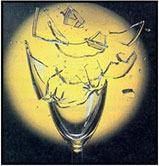
As we explained with our role-playing game analogy, Davidson’s picture still allows us to say that some mental events (Vocations, like Wizards) cause (beat in combat) some physical events (Species, like Humans). Or vice versa. Even though the strict causal laws (Combat Rules) are only expressed in terms of physical properties (Species). Because every token mental event will also be a token of some physical type, and thus will fall under some physical causal law or other.
However, if a (Elven) Wizard came up to us and bragged about beating a Human and pretended that it was because of her Wizardly prowess, we could object: No, your being a Wizard had nothing to do with it. You only won because you were an Elf and your opponent was Human.

In the same way, if a soprano sings “I’ll never forgive yooooouuuu” and that makes the glass break, plausibly the breaking was just due to the pitch and volume and so on of how she sang. The fact that it was the word “you” she was singing would be irrelevant. If she sang “I will always be bluuuuueee…” at the same pitch and volume, the glass would also break; and if she sang “you” at a different pitch and volume, the glass wouldn’t break.
In the same way, Davidson’s opponents complain, he hasn’t really given the mental properties of our token mental states any causal work to do. All the causing is happening in terms of their physical properties. Sure, my believing on Monday that there’s aspirin in the kitchen (which was also neural events N in my brain) on his picture caused my body to move into the kitchen and ingest aspirin. But this was because the cause was a neural event of type N. Its being a belief about aspirin isn’t what made that happen.
We said that it was a guiding idea of Davidson’s approach to mental causation that whenever there is singular causation (one token event causing another), it’s always underwritten by a general law. But not every philosopher accepts this. In recent years other approaches to causation have become more popular.
One approach that started to become influential around 1970 is to think of causation in terms of counterfactuals. Here the idea is that for a token event c to cause another token event e, it has to be the case that if c hadn’t occurred, then e wouldn’t have occurred either. (This idea has roots in the mid-1700s philosopher Hume we mentioned earlier.)
Now some philosophers have tried to understand counterfactuals in terms of laws, too. So that wouldn’t take us too far away from the picture of causation in terms of laws that Davidson was working with. But other philosophers understand counterfactuals differently. The thing that’s usually said here is that a claim like if c hadn’t occurred, then e wouldn’t have occurred either means that:
The closest possible world(s) where c is false is/are one(s) where e is false too.There are lots of issues making sense of such proposals. One important thing is, their proponents have to tell us what they mean by “closest possible world.”
Also, there are cases where arguably, if c hadn’t occurred, then e wouldn’t have occurred either seems to be false, but we still intuitively want to count c as a cause of e.
One example would be the phenomenon of overdetermination we discussed earlier in the term. What if c was a sufficient cause of e, and d was another simultaneous sufficient cause of e? So it’s not that c and d cooperated to jointly cause e, but wouldn’t have been able to do it on their own. Rather, each would have on its own been enough; it just happened that both were in place. For example, maybe c was you putting cement in my running shoes Thursday night. And d was another neighbor’s locking me inside the house while I slept, the same night. Arguably each of these caused me not to go running on Friday. Here e is “My staying home instead of running on Friday morning,” and e’s not occurring would be that I do go running. But if c wouldn’t have happened, probably d still would have happened, and I still wouldn’t have gone running. So e would still have occurred.
Another kind of example are where there’s one cause and another “backup” cause that doesn’t actually happen, but would happen if the first one didn’t. Changing the previous example slightly, perhaps d didn’t occur (the other neighbor didn’t lock me in the house) because they saw you pouring the cement in my running shoes. But if you hadn’t done that, then they would have locked me in the house. So if c hadn’t occurred, d would have occurred instead, and so e (my not running) would still have happened.
In both these cases, we intuitively want to say that (token event c) your pouring the cement in my running shoes Thursday night caused (token event e) my staying home instead of running on Friday morning. But it’s not clear that if c hadn’t occurred, then e wouldn’t have occurred either. Fans of this approach to causation have discussed these issues extensively, and have different interesting (and sometimes complicated) solutions.
If we could explain causation in terms of counterfactuals instead of in terms of laws, then even if Davidson is right that there aren’t any (strict) laws about mental types of events generally causing physical types of events (or vice versa), maybe that wouldn’t be a threat to the possibility of mental causation.
Of course, this also is something philosophers argue differently about.